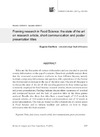Identificador persistente para citar o vincular este elemento:
https://accedacris.ulpgc.es/jspui/handle/10553/12241
| Título: | Framing research in food science: the state of the art on research articles, short comminications and poster pesentatios | Autores/as: | Cianflone, Eugenio | Clasificación UNESCO: | 570107 Lengua y literatura 550510 Filología |
Palabras clave: | Titles Food science Research article Short communication Poster presentation |
Fecha de publicación: | 2013 | Publicación seriada: | LFE. Revista de Lenguas para Fines Específicos | Resumen: | Titles are the first point of contact with readers and are encoded to provideconcise information on the paper’s contents. Data from available surveys showthat the structural construction conforms to four different layouts, namelynominal, compound, full-sentence and question, with a prevalence of the formertwo formats and an increase in the use of the latter ones. The aim of this paper isto discuss the state of the art of title encoding practices in three written genrescommonly employed in Food Science: research articles, short communicationsand poster presentations. Findings indicate the prevalent occurrence of nominaland compound layouts and the lack of question titles in the three genresanalysed. Results also show that titles have a mean length of 15.3 words inresearch articles, of 14.6 words in short communications and of 12 words inposter presentations. The data are shared to offer a framework of current praxisin Food Science and to inform teachers and authors on how to shapeinformative titles for their research. | URI: | https://accedacris.ulpgc.es/handle/10553/12241 | ISSN: | 1133-1127 | Fuente: | LFE. Revista de Lenguas para Fines Específicos [ISSN 1133-1127], n. 19, p. 269-286 |
| Colección: | LFE, Rev. leng. fines específ. n.19, 2013 Artículos |
Visitas 10
190
actualizado el 14-dic-2024
Descargas
158
actualizado el 14-dic-2024
Google ScholarTM
Verifica
Comparte
Exporta metadatos
Los elementos en ULPGC accedaCRIS están protegidos por derechos de autor con todos los derechos reservados, a menos que se indique lo contrario.
